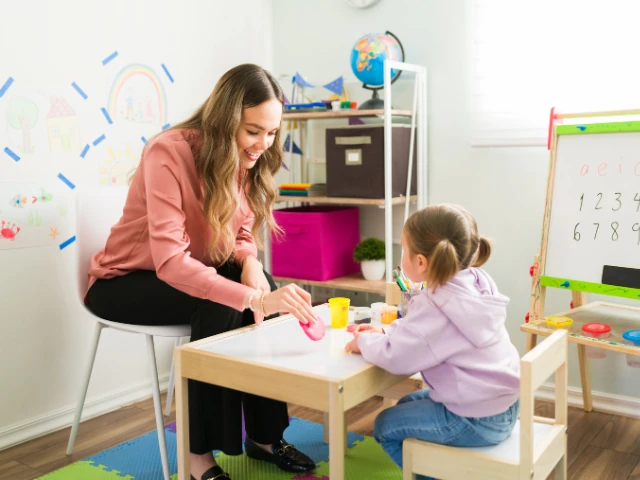As parents, we all want our children to get the best possible head start in life.
The formative years are incredibly important – which means the greatest gift you could give your child is a secure, stable foundation for future development.
It’s also no secret that even very young children often face challenges like anxiety, social pressure, and the inability to express their emotions appropriately – and they need the right support and guidance to navigate those pressures.
Here at My Therapy ConnectionTM, we’re firm believers in the power of play therapy as a proven way to work through feelings, improve communication, and build confidence. Best of all, your child is in a safe space while finding enjoyment and making creative new discoveries in the process.
Here’s how it works.
What Is Play Therapy?
Play therapy is a type of counseling that uses play as the primary medium for communication. For children, play is their natural way of exploring the world and expressing themselves. In a play therapy session, toys, art materials, and games become tools that help children:
- Process and express their emotions in constructive ways.
- Learn to solve problems using imagination and creativity.
- Develop healthy coping strategies to reduce stress and resolve conflict.
Our highly trained therapists guide each session, helping your child address their unique challenges in a way that feels natural and supportive.
The Benefits of Play Therapy for Your Child
Play therapy isn’t just regular “playing around” in a recreational way. It’s actually a remarkably powerful therapeutic approach with proven benefits. Here are some of the most important ways play therapy can help your child:
- Improved emotional expression: children who struggle to talk about their feelings can use toys and activities to express themselves, making it easier to address emotions like fear, anger, or sadness.
- Better social skills: through role-playing and guided interactions, children can practice sharing, taking turns, and resolving conflicts – skills they’ll need both in and out of the classroom.
- Reduced anxiety and stress: play therapy provides a safe outlet for children to process worries and learn calming strategies they can use in their daily lives.
- Enhanced confidence: accomplishing tasks during therapy helps children build self-esteem and trust in their abilities.
Art Therapy: A Creative Complement
Art therapy – distinct from play therapy, but sometimes they’re combined – uses creative activities like drawing, painting, and sculpting to help children explore their thoughts and feelings.
Of course, the focus here isn’t on learning how to create art! The deeper purpose of art therapy is to equip children to express themselves in ways that are intuitive, spontaneous, and honest, in an environment that stimulates self-expression. Art therapy can serve to:
- Unlock hidden emotions: sometimes children can’t articulate what’s bothering or distressing them, but their art can reveal clues to their inner world.
- Encourage mindfulness: art projects help children focus on the present moment, reducing stress and fostering a sense of calm. This is a particularly helpful first step for children who struggle with attention, focus, or overstimulation.
- Build problem-solving skills: art-based activities challenge children to think creatively and find solutions. In a very real and practical way, this enables even young children to begin relating concepts and “connecting the dots” as they discover a sense of connectedness and order in what they’re doing.
Preparing for a Successful Year
Play therapy can set the stage for a strong school year, happy, well-balanced friendships, and a much more peaceful home life. But more than that, it brings about amazingly positive changes in your child’s inner world – changes that profoundly benefit your child’s sense of self-confidence, personal identity, and ability to cope with external pressures.
- At school: play therapy can help your child manage school-related anxieties, adapt more easily to new routines, and improve focus and behavior.
- Socially: by developing better communication skills in therapy, children learn how to form positive relationships and handle peer dynamics with greater confidence and ease.
- At home: play therapy can help reduce tantrums or emotional dysregulation, improve cooperation, and create more harmonious family interactions.
Here’s What You Can Do
As a parent, your involvement is a vital part of your child’s success in therapy. Here are a few ways you can help support the process:
- Be patient. Remember, meaningful change takes time. Trust the therapy process and celebrate small victories along the way.
- Stay engaged. Whether it’s being involved in a therapy session, or providing additional guidance in your home environment, your role as a parent is one of the most important influences on your child’s development.
- Communicate openly. We encourage you to share insights about your child’s behavior and progress with the therapist to help tailor sessions to your child’s exact needs. Remember that therapy is always a professional partnership!
Give Your Child the Gift of Support
Childhood is a time of growth, exploration, and occasional bumps in the road. Play therapy offers children the tools they need to overcome challenges and succeed – academically, socially, and emotionally.
If your child is struggling or could use extra support, consider reaching out to us. We’ll work with you to help build a brighter, more confident future together – and provide you with the insights and resources you’re looking for. My Therapy ConnectionTM is committed to serving our community, uplifting couples and families, and helping individuals experience fullness and joy in their lives.
Contact us to book your complimentary 10-minute consultation call. We’ll answer any questions, provide advice and direction, and recommend a therapist who can provide the best possible counsel and support for your child’s specific needs.




